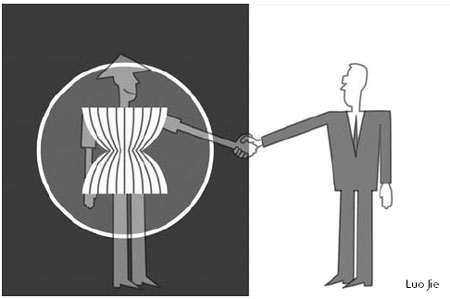
|
OPINION> OP-ED CONTRIBUTORS
 |
|
On the road to develpoment with ASEAN
By Zhai Kun (China Daily)
Updated: 2009-08-21 07:57 Economic integration and cooperation among members of the Association of Southeast Asian Nations (ASEAN) and a wider East Asian region are expected to intensify with the 10-member bloc having reached a series of agreements. ASEAN held foreign minister-level meetings in Phuket, Thailand, from July 20 to 23 as a preparatory move for this year's ASEAN+3 and East Asian summit scheduled for Oct 23-25. The event grabbed global attention when US Secretary of State Hillary Clinton attended a concurrent ASEAN Regional Forum (ARF) and signed the Treaty of Amity and Cooperation (TAC) in Southeast Asia with ASEAN members. The move is seen as the return of the superpower to the "critically important" region. During the forum, Clinton met with the foreign ministers of countries along the Mekong River - Thailand, Vietnam, Loas and Cambodia - and pledged further cooperation with them on water resources, education and human resources development. The fourth Pan Beibu Gulf Economic Cooperation Forum was held on Aug 6-7 in Nanning, capital of the Guangxi Zhuang autonomous region, where a feasibility report aimed at strengthening studies on ASEAN-China maritime economic cooperation was approved. On Aug 8, ASEAN members commemorated the 42nd anniversary of the establishment of the association, and vowed to deepen integration within the region. These could help ASEAN ease its long-intractable dilemma in integration, development and security. Maintaining cohesiveness with ASEAN and preventing it from collapsing have been the biggest challenges for the bloc in recent years. That its summit has been postponed several times because of social unrests in Thailand has added to concerns over the extent of its integration. Terrorist attacks on JW Marriott and Ritz Carlton hotels in Jakarta on July 17, which killed nine people and injured at least 50, has dealt a further blow to people's confidence in regional development. The bomb explosions took place amid experts' warnings that social and economic contradictions within ASEAN members fueled by the global financial crisis could create chaos in the region. The economic model long advocated by ASEAN members, which has seriously harmed the region's ecology, has put the Mekong River valley's environmental issues under global spotlight.
 ASEAN members have clinched a series of TAC agreements with major powers beyond the region, but the group's dilemma over security has grown in recent years. The frenzy that the US, Japan, India and Australia have kicked up by trumpeting their "China military threat" theory has caused unnecessary security concern within the bloc. The rise in tensions over the South China Sea indicates ASEAN members have a wrong impression about a rising China. Some Southeast Asian scholars have even warned that if the situation in the South China Sea worsened it could damage the mutually beneficial environment between the two sides that took decades to build. Fortunately, US President Barack Obama's administration, which has realized that a weak, loose and turbulent ASEAN will not serve anybody's interest, has raised its strategic investment in the regional group to help it ease its development concerns. The smart power concept advocated by Obama and Clinton caters to ASEAN's long-pursued diplomatic ideology. The US' return to the region and its willingness to listen and cooperate with regional formations is believed to be a consolation for ASEAN members, who for long have felt the superpower had been giving them the cold shoulder. Apart from its security commitment not to try to solve any problem through force, Washington's participation in the TAC will help ASEAN balance its strategic posture in the region. The US' promise to cooperate with the countries along the Mekong River, except Myanmar, on climate change and non-traditional security will help the region solve its development dilemma. But ASEAN members have some reasons to worry about the US' return, too. The presence of the US could bring hegemonism back to the region and its promised benefits could prove to be just lip service. The US' refusal to include Myanmar into the Mekong River cooperation bloc, and Clinton's call for ASEAN to "kick the country out" of the association raises such worries. The complicated situation in the South China Sea has luckily not shaken China's determination to intensify efforts to develop strategic partnership with ASEAN and its members. In April, Foreign Minister Yang Jiechi said China planned to create a $10-billion investment fund for and offer $15 billion in credit to Southeast Asian countries. The convocation of the fourth Pan Beibu Gulf Economic Cooperation Forum in Nanning was aimed at actively promoting maritime economic cooperation between ASEAN members on the one side and Guangxi, and Hainan and Guangdong provinces on the other. Maritime cooperation between the two sides in fields such as port, tourism, logistics, financial and infrastructure construction will supplement bilateral economic cooperation in the Mekong River valley. As a move that would ease tensions in the South China Sea, the Beibu Gulf cooperation model will help both sides find new ways out of the global financial crisis and provide them new fields for economic cooperation at the time after a free trade area between them is set up next year. We have reason to believe that at the upcoming ASEAN summit and the synchronized Sixth China-ASEAN Expo, China and ASEAN will reach a series of agreements on their road to a common and mutually beneficial development. The author is director of the Institute of South and Southeast Asian Studies, China Institute of Contemporary International Relations. (China Daily 08/21/2009 page9) |